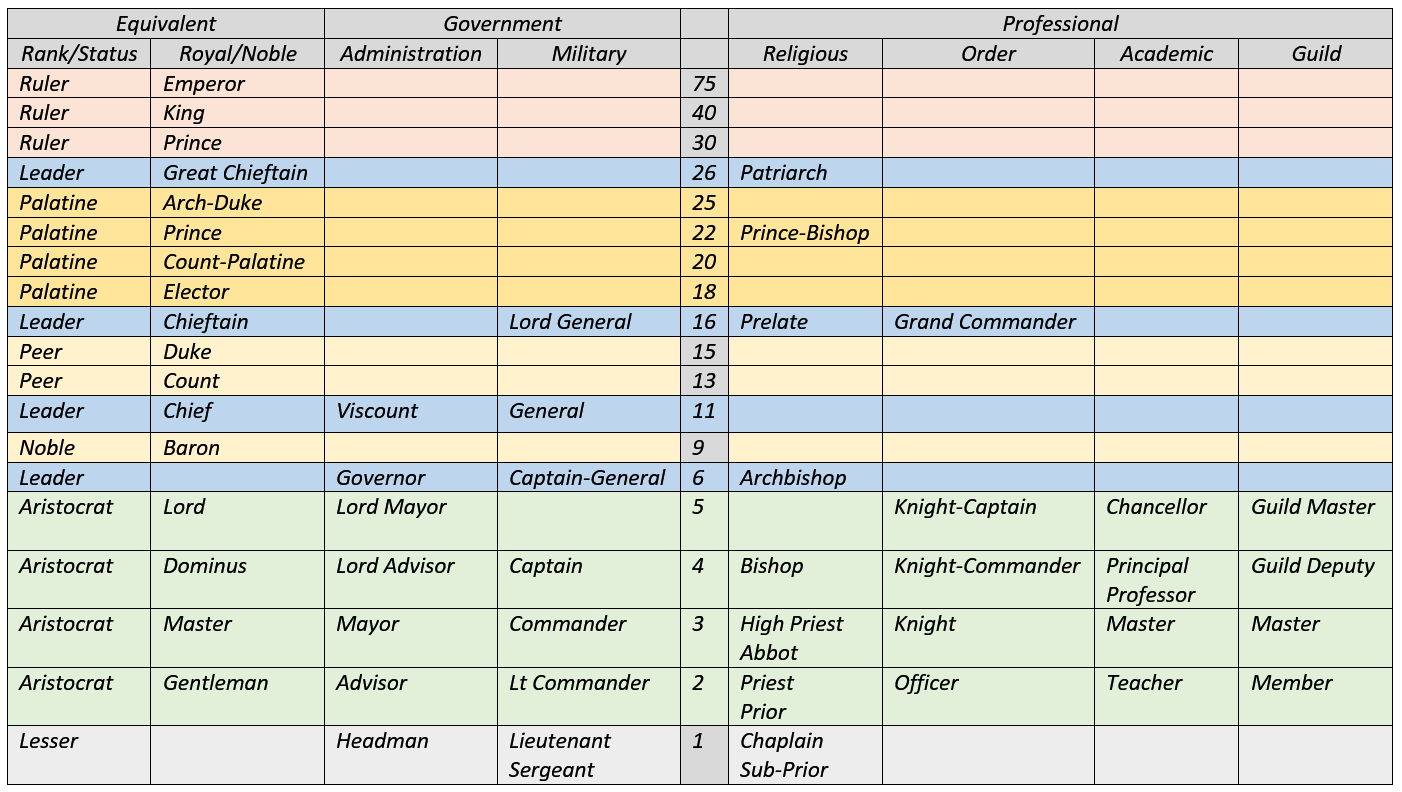Table of Contents
Ranks and Titles
A basic analysis of different ranks and titles - and a rough comparison of status and influence. However, there can be quite a lot variation. Some people might have more than one title and may accumulate the 'status' from each. Others might just have a larger than normal army at their command or have cornered the market in an important commodity. The table is a guideline rather than absolute.
Midmarch
Use this table for the Stolen Lands (Midmarch) game
| National Titles | Local Titles | ||||||||
|---|---|---|---|---|---|---|---|---|---|
| Status | Royal | Chivalric Order | Administration | Military | Religious | Academic | Guild | ||
| 75 | Emperor | ||||||||
| 55 | King | ||||||||
| 40 | Duke | Primate | |||||||
| Nobles | |||||||||
| 20 | Count | ||||||||
| 15 | Viscount | General | |||||||
| 12 | Baron | ||||||||
| Aristocrat | |||||||||
| 10 | Governor | ||||||||
| 7 | Lord | Knight-Captain | Lord Mayor | Captain General | Arch-Bishop | ||||
| 6 | Dominus | Knight-Commander | Lord Advisor | Captain | Bishop | Chancellor | Guild Master | ||
| Other | |||||||||
| 4 | Laird | Knight | Mayor | Commander | High-Priest / Abbot | Principal | Master | ||
| 3 | Member | Lt Commander | Priest / Prior | ||||||
| 2 | Officer | Town Advisor | Lieutenant | Chaplain | Teacher | Guildsman | |||
| 1 | Deputy | Reeve | Sergeant | Sub-Prior | |||||
Notes
Administrative titles are generally Appointments, and the incumbent could be removed by their superiors or electorate.
- Regional Officials. A Viscount is normally the senior Baron in a county, a Governor is the senior Aristocrat (Dominus or Lord) in a region.
- City Officials. Lord Advisors might be treasurer, councillor, marshal etc. The Lord Mayor of a large independent City (such as Restov) will have the same levels of influence as a governor or Lord Mayor of an Independent Metropolis (such as New Steven) has the same influence as a Viscount.
- Town Officials. Advisors might be treasurer, councillor, marshal etc.
- Reeve. Someone appointed to manage a village.
General Analysis
Don't feel that you need to use every single one of those titles. About the only time they should all be used at once, is if you have an Empire the size of the Holy Roman Empire and its largest. Most games will only use a subset of the table.
If you play in The Stolen Lands Game - use the table at the top of the page.
- Rulers: - Rule something in their own right, and have the ability to define rules and laws for their subjects.
- Palatines: - Are lesser rulers who have sworn allegiance to a Ruler, but have the power to set (at least some) of the rules and laws for their subjects.
- Peers: – Don’t Rule, but manage a region on behalf of their King (or queen). They implement the rules and laws that the King lays down. However, they are seen as ‘almost equal’ to the Monarch, and serve as their chief advisors. Few Monarchs will be able to rule their Country without the support of their Peers. Losing that support leads to Civil War.
- Leaders: - The senior person who leads something intangible - a Faith, Family, Army, Independent Order etc. It can be a difficult job, mediating between the needs of their followers and the Monarch – and they may need to find a compromise position. Very senior leaders, such as the Supreme Head of a religion, might have followers spread across a number of different countries. Lower status leaders, such as a Governor, might just have a following in one small region.
- Nobles: Manage something, and implement the rules and laws on behalf of their Ruler. Their holdings are smaller than peers and they have local (rather than national) influence.
- Aristocrats: - Junior Titles that are a rewards doing something important to your ruler or for promotion in your ‘profession’. The more you impress, the better the title you get.
Here are some links to the pages that describe the broad categories in more detail.
- Aristocratic Titles - some thoughts on Nobles titles and how they can be used.
- Military Ranks - A unified military system that makes life easier for me :)
- Religious Ranks - These don't apply to all faiths, are a bit mix and match and are meant as tool for PCs rather than a straight jacket.
- Administrative Titles - People appointed to represent the Lord / Ruler / Mayor and their authority in an area.
- Orders - covers positions in various Militant and Chivalric Orders
- Other Titles - Academics and Guilds - there could be more later …

